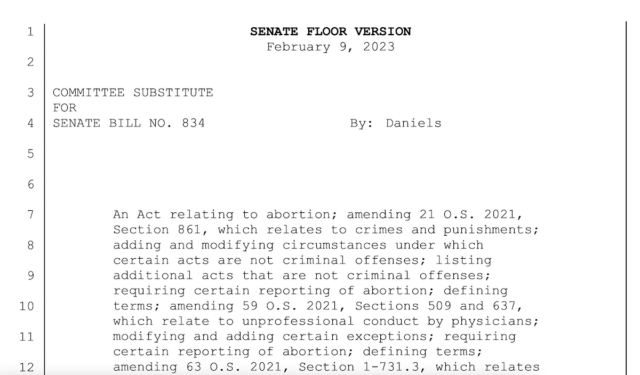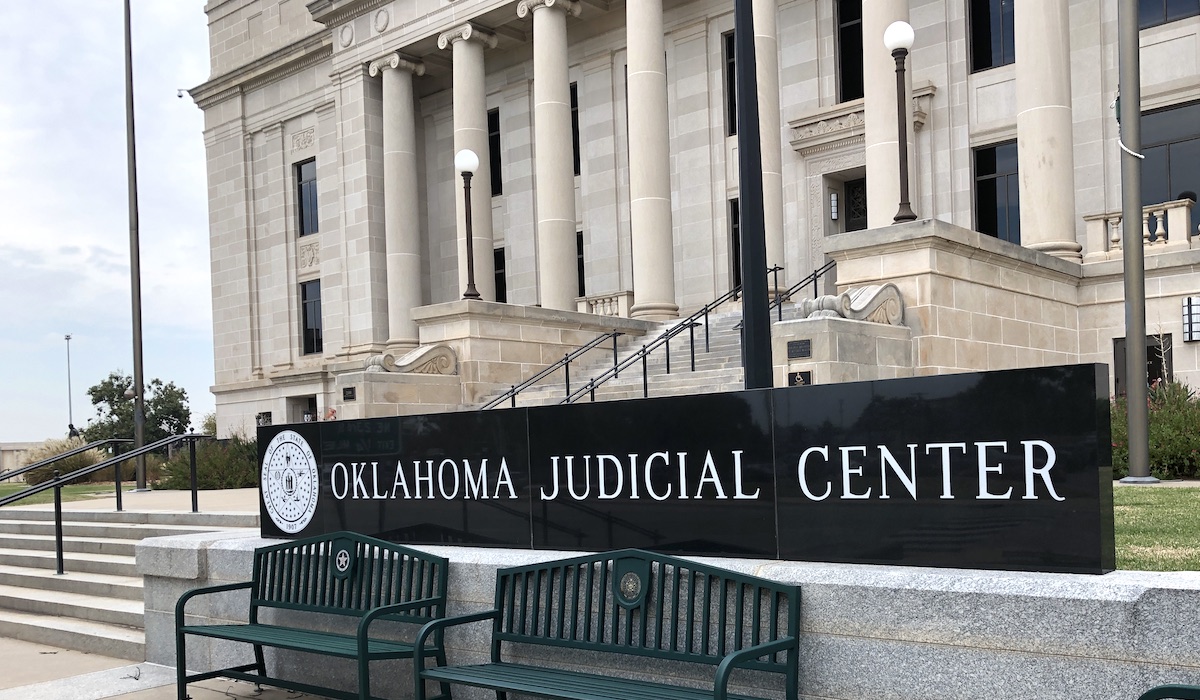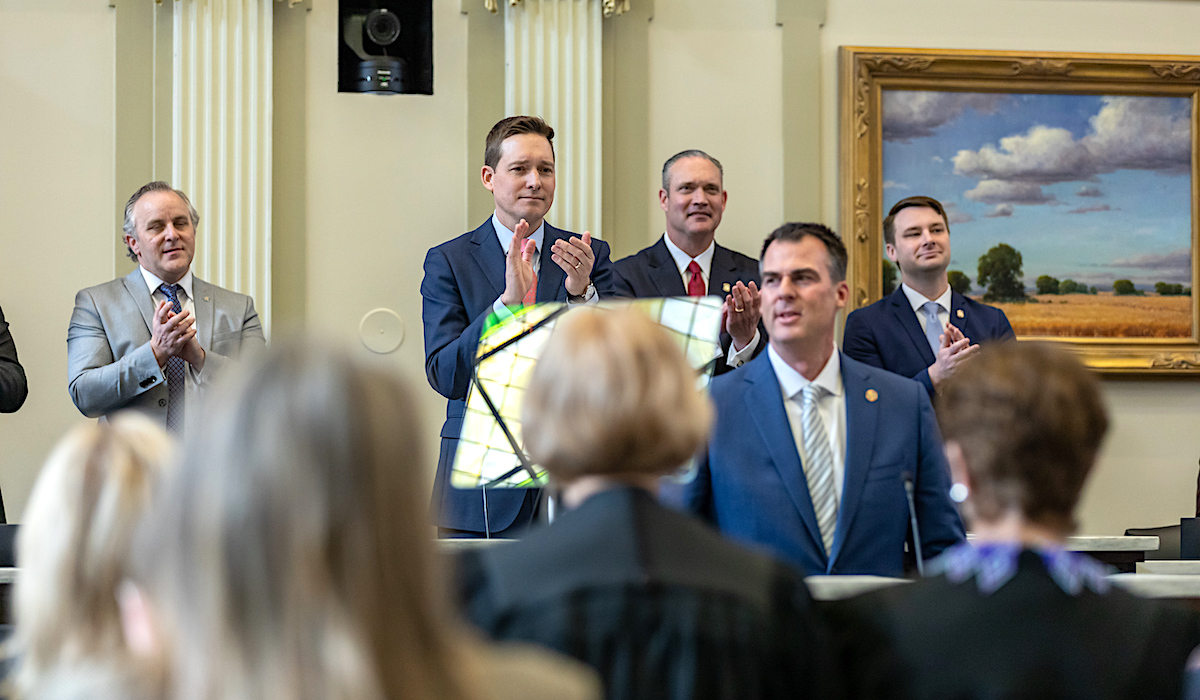
(Update: Senate President Pro Tempore Greg Treat (R-OKC) told media on the afternoon of Thursday, March 23, that SB 834 would not be heard on the Senate floor even though he supports the bill in an effort to avoid a state question regarding the legalization of abortion in Oklahoma. The article below remains in its original form.)
In its current form, SB 834 would codify an Oklahoma abortion ban exception for instances when rape or incest result in pregnancy, but its Senate author says her Republican Caucus colleagues have not decided whether to grant it a hearing before Thursday’s floor-work deadline. Meanwhile, the speaker of the state House of Representatives says his GOP Caucus has not discussed the concept yet and likely will not consider it if the Senate does not move first.
The possibility that SB 834 could stall in the Senate comes on the heels of an Oklahoma Supreme Court decision Tuesday that said the state Constitution guarantees a right to abortion in instances when the mother’s life is in danger. Abortions under those circumstances were already legal in Oklahoma, but the 5-4 court ruling said inconsistent definitions in state statute necessitated justices’ determination that two portions of Article II of the Constitution guarantee a woman access to abortion services in those instances:
- Section 2 establishes the “inherent right to life, liberty, the pursuit of happiness and the enjoyment of the gains of their own industry.”
- Section 7 states no person shall be “deprived of life, liberty, or property, without due process of law.”
In the majority opinion, justices said they had declined to consider broader questions about whether the Oklahoma Constitution contains additional rights to abortion.
Functionally, the ruling provides doctors greater flexibility about when to make a determination that a pregnant woman’s life is at risk. As could be expected, pro-choice advocates celebrated the court decision as a step toward restoring access to abortion in Oklahoma, while Republican leaders like Gov. Kevin Stitt criticized the court and touted their pro-life bonafides.
“In their 20-page opinion, not once was there any mention of the unborn,” Stitt said in a statement. “From the moment life begins at conception, we have a responsibility to do everything we can to protect that baby’s life and the life of the mother. That is what I believe and that is what the majority of Oklahomans believe which is why the Legislature has passed, and I have signed, numerous laws banning abortion in Oklahoma.”
McCall: House Republicans waiting on Senate action
While running for reelection in October, Stitt said he would support exceptions allowing abortion in the instance of rape, incest or a pregnant woman entering treatment for alcohol or drug addiction.
“If the Legislature put that on my desk, I would sign that,” Stitt said when asked about those potential exceptions during a debate.
But as Thursday’s floor-work deadline approaches, even the Senate author of SB 834 said she is unsure if the rape and incest exception measure will receive a hearing.
“That decision yesterday unified everyone in the room to the seriousness of the state we now find in terms of the unborn child, literally the threat to the unborn child,” said Sen. Julie Daniels (R-Bartlesville).
Still, on Wednesday morning, Daniels said the Senate GOP Caucus remains split over whether to hear SB 834, which she said would establish uniformity of definitions and prohibitions related to abortion. The law that allows a civil lawsuit against physicians who perform abortions currently includes exceptions for rape, incest and instances where a woman’s life is in jeopardy.
But Oklahoma’s law that features criminal penalties for doctors who perform abortions includes only an exception for the life of the mother. SB 834 would establish the rape and incest exceptions for the criminal penalty law.
“SB 834 is designed to specifically address what happened yesterday, to make sure we as a Legislature are clear, concise and standardize our language throughout this patchwork of laws we passed over the years while Roe (v. Wade) was in effect,” Daniels said. “We are addressing this as a way to tell Oklahomans these exceptions appear throughout our laws so someone can’t suggest that there is no right to save the life in an emergency because it’s not listed specifically somewhere. We wanted to make sure we had consistency.”
Daniels declined to describe the differences of opinions in the Senate GOP Caucus regarding her bill, but she said she would like her colleagues to advance SB 834 to keep the bill alive this session.
House Speaker Charles McCall (R-Atoka) said his chamber is waiting to see the fate of SB 834 in the Senate. Rep. Marcus McEntire (R-Duncan) filed a House bill similar to Daniels’ proposal this session, but it was not heard in committee by the prior deadline.
“I would say if the Senate does not move the bill out of their chamber, there’s not a House bill that we’re going to act on this year. There could be further discussions throughout the rest of the process, but ultimately agreements come about if there is wide support for a particular approach,” McCall said Wednesday. “I think people see it differently. I think there are people who would like to see it uniform in both the criminal and the civil code. I think there are people who would like to see the civil code move to just the life of the mother only. I think there are some people who want to see no exceptions, period.”
Daniels said she does not personally agree with abortion ban exemptions in the case of rape or incest, downplaying the overall numbers of those cases in the larger abortion picture across the country. Politically, however, she said she believes Republicans in the Legislature should establish the exceptions uniformly.
“I believe it would be in our best interest to have it,” she said. “The life of the mother and rape and incest amount to about 5 percent or less of all abortions. Those are still lives. I absolutely do acknowledge that. But trying to put us in a position where no one can spread disinformation or misinformation about what is in our laws is important.”
Daniels said failure to codify rape and incest exceptions could increase the potential for a future ballot initiative to expand abortion access in Oklahoma.
“That’s quite possible if you look at the history of ballot initiatives in other states and the things pro-abortionists focus on,” Daniels said.
McCall also referenced the potential for a ballot initiative regarding abortion access. A similar August 2022 state question in Kansas resulted in 59 percent of voters supporting abortion access.
“It remains a very emotional issue and one that even Republicans can see differently,” McCall said. “I am for protecting the life of the unborn, personally, but I do understand that many of my colleagues here in the Legislature that are pro-life see these exceptions in a different way.
“So it’s not an issue we’ve talked about in the House as a caucus yet this year. At some point in time, that issue is going to have to be considered and addressed either through a state question or through legislation, if it is going to change from what it is.”
Court decision affirms constitutional right for a woman’s life

In the case decided Tuesday, the Oklahoma Supreme Court’s majority opinion (embedded below) ruled that women seeking an abortion in Oklahoma have a limited right to obtain one depending on their own medical needs and circumstances.
Justices Norma Gurich, James Winchester, Douglas Combs, James Edmondson and Yvonne Kauger made up the majority decision.
Chief Justice John Kane IV, Vice Chief Justice Dustin Rowe, Richard Darby and Dana Kuehn dissented, each writing their own opinion.
Kauger and Combs sided with the majority but wrote their own opinions.
Kauger, who was appointed by former Gov. George Nigh, concluded her concurring opinion by referencing the pending proposals in the Legislature:
Although the Oklahoma Legislature is considering several bills which address termination, and there may be an initiative petition or referendum, this is the cause before us. We need to do our jobs, uphold our oaths of office, and address the issues without delay rather than speculate about what might be. For some women, the draconian law which allows no exception, in the absence of a medical emergency to preserve the life of the mother, may be a death sentence. In some instances, women may have fewer rights than a convicted murderer on death row. These women may be subject to a death sentence without being afforded due process or any provision for clemency or pardon. Imagine that.
The majority opinion said SB 612, passed by the Legislature and signed by Gov. Kevin Stitt last year, was void and unenforceable. However, a prior criminal prohibition of abortion in Oklahoma had already existed and was triggered to take effect last year by the U.S. Supreme Court’s decision Dobbs v. Jackson.
In its Tuesday decision, the Oklahoma Supreme Court did not take up the issue of elective abortions, which are still banned in Oklahoma under state law.
“We make no ruling on whether the Oklahoma Constitution provides a right to an elective termination of a pregnancy, i.e. one made outside of preserving the life of the pregnant woman as we have defined herein,” justices wrote in their majority decision.
Stitt: ‘I wholeheartedly disagree with this activist majority’s opinion’

In his statement, Stitt criticized the majority decision of the court, calling the five justices “activists.”
“I wholeheartedly disagree with this activist majority’s opinion creating a right to an abortion in Oklahoma,” Stitt said in a statement. “Alarmingly, this activist majority acted out of hand by making a policy decision that belongs to the people. Chief Justice Kane said it best in his well-written dissent: ‘This Court should adhere to the Constitution given to us, not craft what we believe to be a ‘better’ Constitution. The power lies with the people.”
Stitt’s labeling of the five judges as “activist” amused some Wednesday, since Justice James Winchester’s wife, Susan, is a former Republican lawmaker who serves in Stitt’s Cabinet as secretary of licensing and regulation. Appointed to the Supreme Court by former Gov. Frank Keating in 2000, Winchester has long been considered among the most conservative voices on the court.
Oklahoma Attorney General Gentner Drummond provided a brief statement in response to media inquiries.
“We respect the Court’s ruling and are pleased the justices acknowledged the exception for cases in which the life of the mother is at risk,” he said in a statement.
Planned Parenthood Great Plains issued a statement from its CEO, calling the ruling “a small step,” but saying “so many people who need care have been left behind by this court.”
“Today’s decision is the first step in what will be a long journey to restore real, meaningful rights of Oklahomans over their own bodies. But make no mistake: this is a small step. The Oklahoma Supreme Court recognized one fundamental truth: patients must be permitted to access critical care to save their lives,” said Emily Wales, the president and CEO of Planned Parenthood Great Plains. “But the right recognized today is so limited that most people who need abortion will not be able to access it. This ruling will have severe repercussions for the health and well-being of Oklahomans. So many people who need care have been left behind by this court. Health care providers’ hands are still tied by an abortion ban that would make them criminals for providing essential care. With abortion access functionally eliminated in the state, Planned Parenthood Great Plains will continue doing everything we can to be here for people who need us, just as we have been for decades.”
Read the Oklahoma Supreme Court ruling
 Loading...
Loading...
(Correction: This article was updated at 2:25 p.m. Thursday, March 23, to correct the name of Justice James Edmondson and correct reference to Kauger’s appointment. NonDoc regrets the error.)





















